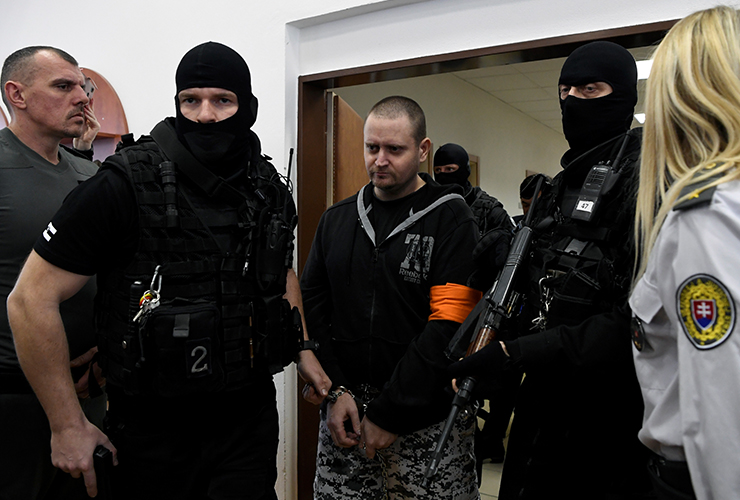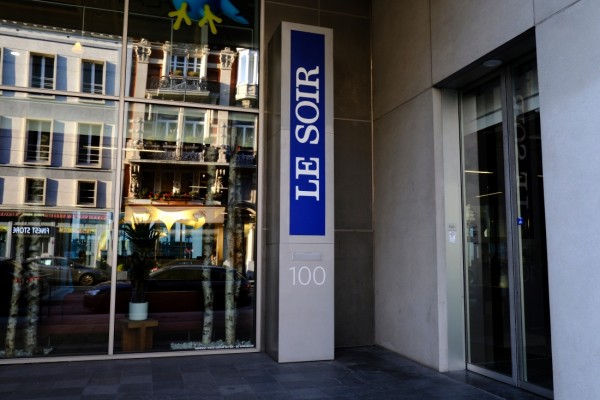A court in Bratislava today accepted the landmark indictment of four suspects accused of ordering and carrying out the murder of Slovakian investigative journalist Ján Kuciak and his financée Martina Kušnírová in 2018.
The decision at the Special Criminal Court paves the way for the main trial to begin on January 13, 2020, in a case which will act as a key test for the central European country’s judicial system.
The parents of both Kuciak and Kušnírová were watching from the side-lines of the preliminary hearing, Peter Bardy, editor of the Aktuality.sk news website where Kuciak worked for before his murder, who was at the trial, told IPI.
None of the accused looked into the eyes of the victims’ families as they were escorted into the courtroom by heavily armed guards, Bardy said. They each face prison sentences of between 25 years or life.
Among those in court were high-profile businessman Marian Kočner, who is accused of contracting the assassination in retaliation for Kuciak’s investigations into his business dealings involving Italian companies in Slovakia, Italian organised crime groups, and Slovakia’s ruling party Smer.
He stands accused alongside co-defendants Miroslav Marcek, who is accused of pulling the trigger, and his alleged accomplice, Tomas Szabo. A fourth suspect, Alena Zsuzsova, is also accused of acting as an intermediary.
The gunman has admitted to the shootings, while the other three defendants have denied the charges.
A fifth man involved in the killing, Zoltan Andrusko, previously confessed to facilitating the murder but has made a plea deal with police to act as a key witness against the other suspects. He will face a special hearing scheduled for December 30.
Today the court also ruled to impose reduced sentences if the accused confess during the main trial.
IPI Executive Board Vice Chair Beata Balogová, editor-in-chief of the leading Slovak daily newspaper SME and a key voice in the fight against impunity for Kuciak’s and Kušnírová’s murders, hailed the decision as an important first step in achieving justice.
Balogová, however, noted that investigations must not stop as many others have played a role in allowing the murders to be committed in the first place and slowing down investigations.
“Along with the suspected murderers and the mastermind, there are others, politicians, oligarchs, judges, lawyers and police, who contributed to the rise of the underworld that felt so protected that it murdered a journalist”, she said. “Thus this court trial is only the very first step, though a crucial one, towards enforcing the rule of law in this country. Yet, we also think about the families who during the trial will re-live the hell of the irreversible loss.”
Kuciak’s murder
Kuciak and his girlfriend, both 27, were killed at their home near Bratislava on February 21, 2018.
The young journalist had worked for the online news site Aktuality.sk and uncovered allegations of tax fraud and financial crime implicating prominent business and political leaders in Slovakia.
The double murder shook the central European country and led to the biggest protests since the 1989 Velvet Revolution, badly damaging the ruling social democratic Smer party and leading to the resignation of then Prime Minister Robert Fico.
The trial has also thrust the issue of corruption links between the Slovakian business and political elite into the spotlight.
During investigations, special prosecutors were able to access thousands of encrypted messages on Kočner’s phone. These messages were later leaked to Slovak media, which published major revelations about Kočner’s links to politicians and government officials.
Deputy justice minister, Monika Jankovska, resigned after the messages were published, but denied any wrongdoing. Other messages showed Kočner joking about the murder.
Kočner was already in jail in connection with a million-dollar felony scheme when he was charged with Kuciak’s and Kušnírová’s murders in March 2019.
He had allegedly previously threatened Kuciak after he began investigating his own business dealings.
IPI has closely monitored progress in the murder investigation, visiting Bratislava more than a dozen times over the past year and a half to press authorities for justice.



